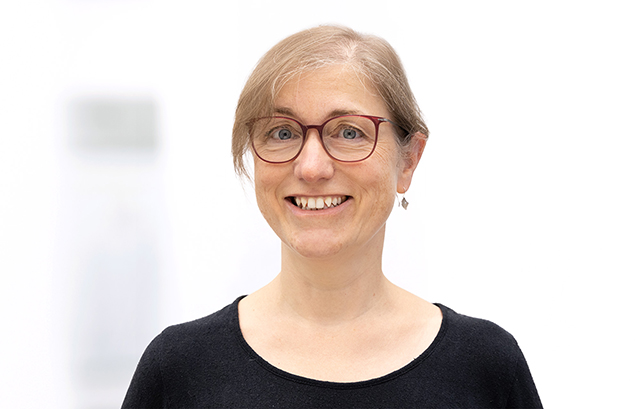Business Area Virtual Material Design
Fraunhofer Institute for Algorithms and Scientific Computing SCAI
Schloss Birlinghoven 1
53757 Sankt Augustin
Germany
Phone: +49 2241 14-4232

Business Area Virtual Material Design
Fraunhofer Institute for Algorithms and Scientific Computing SCAI
Schloss Birlinghoven 1
53757 Sankt Augustin
Germany
Phone: +49 2241 14-4232

Date of Birth: Jan. 12, 1970 in Karlsruhe, Germany
Nationality: German
Family status: married, three children
1989-1999: Studies of chemistry and nutritional chemistry at the Rheinische Friedrich-Willhelms-University in Bonn
1995: First state examination in nutritial chemistry; Study of human medicine
1999: Degree in chemistry -- Diploma thesis with Christel Marian in cooperation with Daniel Hoffmann done at the former GMD (now Fraunhofer)
2001: Preliminary medical examination
1999-2003: Joint Ph.D. study at the Pharmazeutical Institute of the University Bonn and the Fraunhofer Institue for Algorithms and Scientific Computing (SCAI) in Sankt Augustin under supervision of Christa E. Müller
since 2003: Scientific researcher at SCAI
2004-2009: Visiting lecturer in biochemistry at the Rhein-Ahr-Campus in Remagen
On the Nature of Interactions between Ionic Liquids and Small Amino-Acid-Based Biomolecules -- A Tietze, F Bordusa, R Giernoth, D Imhof, T Lenzer, A Maaß, C Mrestani-Klaus, I Neundorf, K Oum, D Reith, A Stark; ChemPhysChem 11/2013
A Glycam-Based Force Field for Simulations of Lipopolysaccharide Membranes: Parametrization and Validation -- KN Kirschner, RD Lins, A Maass, TA Soares; Journal of Chemical Theory and Computation 08/2012
Multi-objective optimisation on the basis of random models for ethylene oxide -- A Maaß, L Nikitina, T Clees, KN Kirschner, D Reith; Molecular Simulation 12/2010
Folding and unfolding characteristics of short beta strand peptides under different environmental conditions and starting configurations -- A Maass, ED Tekin, A Schüller, A Palazoglu, D Reith, R Faller; Biochimica et Biophysica Acta 10/2010; 1804(10):2003-15
The perfect fit? Balancing predictive power and computational complexity for an atomistic model as prerequisite for nano-scale simulations -- A Maaß, TJ Müller, L Nikitina, M Hülsmann; Chemistry Central Journal 01/2009;
Economic simplex optimisation for broad range property prediction: Strengths and weaknesses of an automated approach for tailoring of parameters -- TJ Müller, S Roy, W Zhao, A Maaß, D Reith; Fluid Phase Equilibria 12/2008; 274(1-2):27-35
Modeled ligand-protein complexes elucidate the origin of substrate specificity and provide insight into catalytic mechanisms of phenylalanine hydroxylase and tyrosine hydroxylase -- A Maaß, J Scholz, A Moser; Eur. J. Biochem. 270/2003, 1065-1075
Endogenous tetrahydroisoquinolines associated with Parkinson's disease mimic the feedback inhibition of tyrosine hydroxylase by catecholamines -- J Scholz, K Toska, A Luborzewski, A Maass, V Schünemann, J Haavik, A Moser; FEBS Journal 06/2008; 275(9):2109-21
Adenosine receptor agonists: from basic medicinal chemistry to clinical development -- L Yan, J Burbiel, A Maaß, CE Müller; Expert Opin. Emerging Drugs., 2003, 3 (2), 537-576
Modelling of the TH enzyme reaction, 2nd Symposium Special Basic sciences in PD: Biochemistry and Pharmacology of tyrosine hydroxylase, Department for Neurology, Medical University of Lübeck, Germany, May 30, 2001
A. Maaß, J. Scholz, A.Moser, D. Hoffmann: Docking and calculation of relative binding affinities using a two-stage method for ligands of tyrosine hydroxylase QSAR2000, 13th European Symposium on Quantitative Structure-Activity Relationships, University of Düsseldorf, Aug. 27 - Sept. 1, 2000, Düsseldorf, Germany
J. Scholz, A. Maaß, V. Schuenemann, A. Luborzewski, J. Haavik, D. Hoffmann, A. Moser Interference of salsolinol derivatives present in Parkinson's disease with the enzymatic synthesis of L-DOPA. From a model to the bench 73. Jahrestagung der Deutschen Gesellschaft für Neurologie, Sept. 27 - Oct. 1. 2000, Baden-Baden, Germany
A. Maaß, D. Hoffmann: Computational estimation of relative enzyme inhibitor affinities Structural Heterogeneity and Dynamics of Biological Macromolecules, Joint Meeting of the Dutch and German Biophysical Societies and the Biochemistry and Molecular Biology Society, May 13 - 16, 1999, Hünfeld, Germany
I am interested in capturing a system's behaviour via simulation to render possible new insights. The methods I use are Molecular Dynamics or Monte Carlo techniques applied to organic as well as inorganic or hybrid systems. More and more I am intrigued by the relevance of parameter customization for the underlying force fields and by establishing workflows to deal efficiently with recurring and complex tasks.